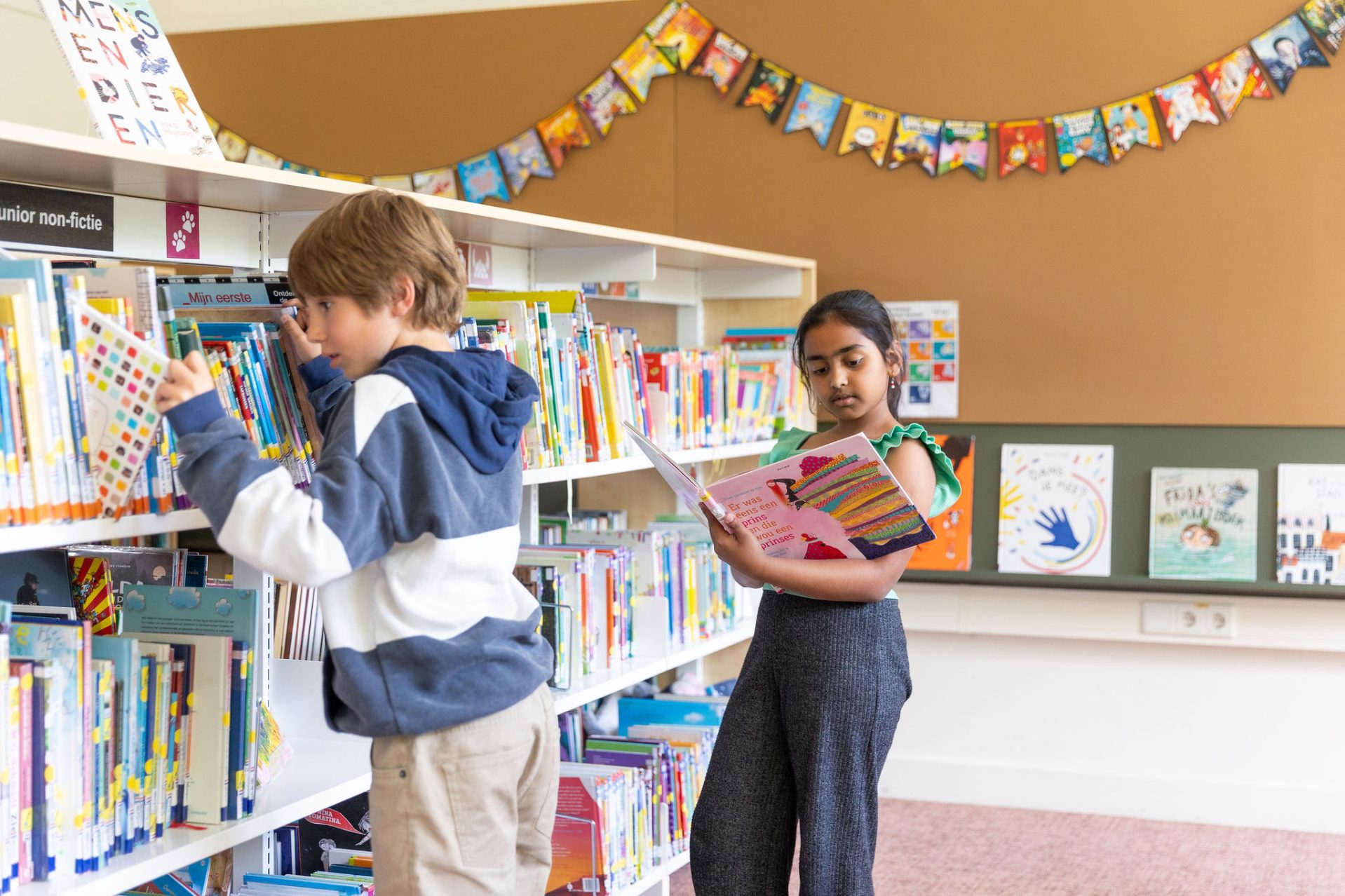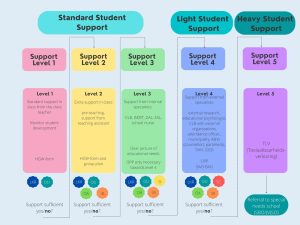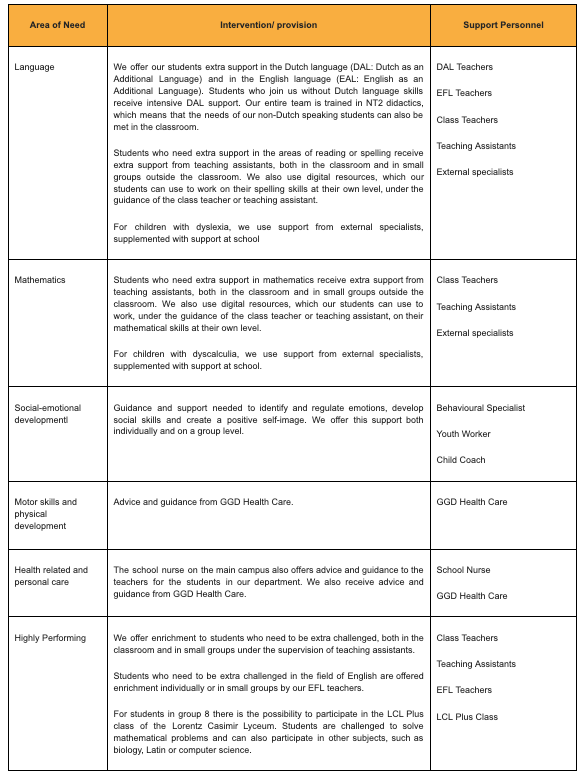
Support and Inclusion
The Primary Department at the International School Eindhoven (ISE) welcomes children from the age of four, regardless of religion, ethnicity, nationality, or beliefs. Rooted in principles of equality and respect, our multicultural environment prepares students for a global future.
Inclusive Education
The ISE is committed to helping each student reach their full potential through:
- Tailored educational environments that address individual needs
- Early identification and support for learning challenges
- Collaboration with parents and students in the learning process
- Clear staff roles in supporting additional needs
Our inclusive approach is built on these core principles:
- Inclusive: Removing barriers to learning and embracing diversity
- Student-Centred: Prioritising each student’s best interests
- Needs-Based: Adapting to strengths and challenges
- Prevention-Oriented: Emphasising early detection and intervention
- Results-Focused: Using evidence-based strategies for positive outcomes
- Collaborative: Involving families, teachers, and students
- Culturally Responsive: Reflecting the diversity of our community
- Equitable: Providing support tailored to individual needs
In order to organize support at school well, all primary schools work together in a ‘Samenwerkingsverband’. In this way, we ensure that all students in the Eindhoven, Best and Son & Breugel regions receive the education and support they need. The schools in this ‘samenwerkingsverband’ make agreements about basic support at schools, about additional support and about referrals to special needs schools. These agreements are recorded in a support plan.
The image below shows the support route within our school, and the other primary schools of the SILFO education foundation.


Within our educational foundation, the internal supervisors of the various schools work closely together, which allows the support to be tailored to the schools, and to support each other in guiding our students. The support for the students at our school is described below.
Basic support
Basic support is the support that is offered within the regular educational process of each school, plus the associated preventive and light curative support.
We work in a goal-oriented way (HGW: Handelingsgericht Werken) to get a complete picture of our students. Goal-oriented work is a systematic way of working, in which the offer is tailored to the educational needs of the students. Based on the child characteristics, we look at which educational needs the child in question has. The education is adapted accordingly.
Our learning support coordinator supervises the overall development of students, with a specific focus on responding to the needs identified by the teachers. She offers support, guidance and advice to both teachers and parents, and ensures that the learning needs of each student are effectively met. The learning support coordinator also works closely with external specialists, giving us access to additional expertise and services when necessary.
Additional support
The additional support is support that exceeds the basic support. The possibilities can differ per school and are described in the school guide. As soon as a student is eligible for additional support from external specialists, this is described in a development perspective plan (OPP), in accordance with the law. The additional support of the student deviates from the regular offer that falls under the basic support. An OPP is drawn up in consultation with parents and with the student. Each OPP is registered in the Register of Education Participants (ROD).
The ISE is a ‘language-friendly’ school. We offer our students additional support in Dutch and English language skills and pay attention to the home languages of our students.
We support students with mild to moderate:
- Language barriers
- Academic support needs
- Behavioural, physical and social-emotional needs
The table below shows the support we can offer our students.

Exemption from educational activities
The competent authority may, at the request of the parents, exempt a pupil from participating in certain educational activities, with the exception of the standardized test in group 8 (doorstroomtoets) as referred to in Article 45b, paragraph 3. An exemption may only be granted by the competent authority. When granting the exemption, the competent authority shall determine which educational activities will replace those from which the pupil was exempted.
Student feedback and input
In the 2024/25 school year, pupils who received additional support were invited to reflect on their experiences and to give feedback. They provided feedback on both the nature of the support they received and their feelings about the support. This feedback provided staff with valuable insights into the effectiveness of the support strategies, the pupils’ sense of inclusion and agency, and areas for improvement in the way in which the support is provided. This school year, we mainly invited our pupils who receive NT2 support (DAL) to give feedback, as this concerns a large proportion of our pupils. The children indicated that they liked receiving support in small groups and that the DAL lessons help them to better communicate in Dutch. They also indicated that it helps them to make friends, because they make contact with their classmates more easily. Furthermore, they indicated that they do not like missing math lessons because of the DAL lesson and that they would actually like to get more DAL support. This school year, our DAL lessons will therefore be organized differently.
From the 2025/26 school year, all students in groups 6, 7 and 8 will be invited to give feedback about the support they receive, regardless of whether they receive specific extra support. This broader approach is intended to gain insight into the overall experiences of students with learning support, classroom strategies and their feeling of support during their learning path. From the 2025/2026 school year, students will also have a say in drawing up an OPP (development perspective).
Steps to be taken in 2025/2026
In the 2024/2025 school year, we started strengthening the support for our non-Dutch speaking students. The entire team has been trained in NT2 didactics and we have evaluated our DAL support. In the 2025/2026 school year, we will organize the DAL support differently, by implementing Wereld vol Woorden, a method for teaching newcomers and by offering our students more intensive (daily) DAL support using this method. With regard to NT2 support in the classroom, we will make agreements at school level and the team will work on further professional development through additional NT2 courses.
One of our teaching assistants will complete intensive training in the field of remedial teaching, which will enable us to support our students even better.
